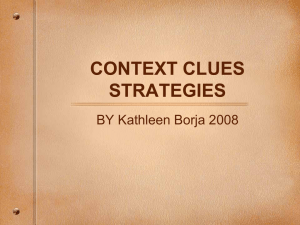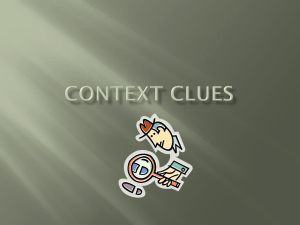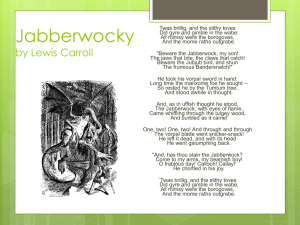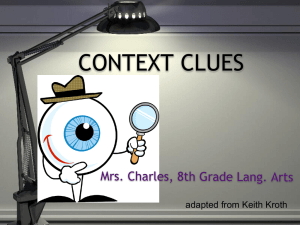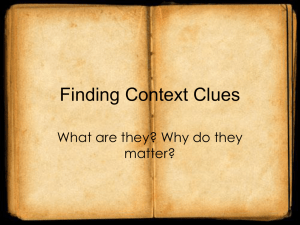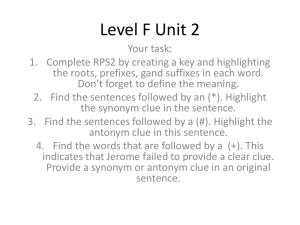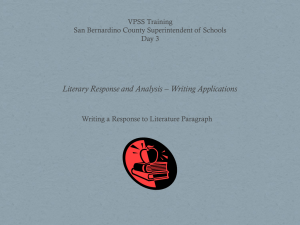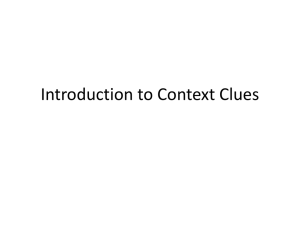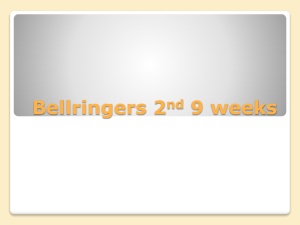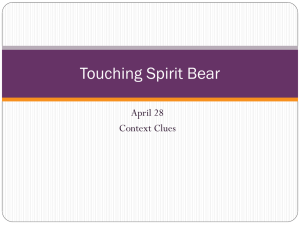ELA CAHSEE Boot Camp Week 2
advertisement
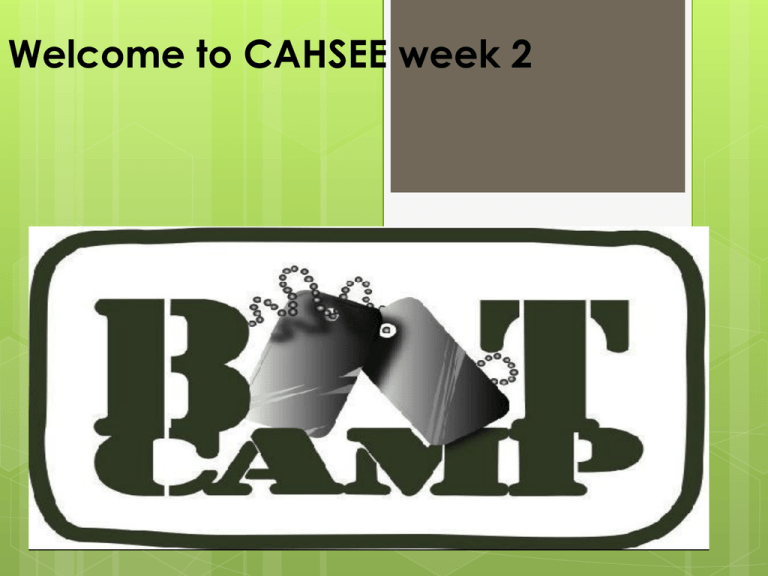
Welcome to CAHSEE week 2 Do-Now Week 2 (write this down in your notebook-5min) 1. List one common prefix and suffix. 2. What are context clues? How can they help you understand ELA questions on the CAHSEE? Agenda 2/1/2014 Do-Now Week 2 (5 min) PPT-Week 2 Word Analysis-Context Clues (15 min) Test Prep Activity#1-Context Clues Practice (10 min) Test Prep Activity#2-PQRST Reading Strategy (15 min) Exit Slip (15-20 min) NOTES- any slide with a green title should be written down in your notebook. ELA CAHSEE Boot Camp Week 2 Word Analysis-Context Clues Standards: 10RW1.1 Identify and use the literal and figurative meanings of words and understand word derivations. [5 questions] 10RW1.2 Distinguish between the denotative and connotative meanings of words and interpret the connotative power of words. [2 questions] The CAHSEE uses 7 multiple-choice questions to measure these standards. There is no magic list of words that will appear on the test, so this section of the Study Guide discusses some of the strategies that can help you succeed. You will be asked to explain what a particular word or phrase means. The CAHSEE measures your understanding of both denotation (the dictionary definition) and connotation (the image or feeling that a word or phrase suggests to readers). For example, house and home have the same denotation: both describe a place of shelter. However, their connotations are quite different. House makes most readers think of particular buildings where people live; home suggests warmth, comfort, and safety (Review)Prefixes, Suffixes, and Root Words Prefix-a word part that can be added to the beginning of a word to make a new word. (dis) Root Word-the word that’s left over when prefixes and suffixes have been removed. (infect) Suffix-a word part that can be added to the end of a word to make a new word. (ant) Dis-infect-ant=Disinfectant COMMON PREFIXES AND SUFFIXES PREFIXES Re= back, again Sub= under Un= not Trans= across, beyond * semi= half, partly SUFFIXES * able ible= able to * fy= to make * ism= the practice of * less= without, lacking * ness= quality of (Review) HOW WILL THIS HELP YOU ON THE CAHSEE? Word analysis skills are very important for the CAHSEE because they will help you decode the meaning and context of words within reading passages and also in the questions you are being asked Word Analysis-Strategies for Deducing Meaning Context clues-Learning This Skill Today! Multiple-choice strategies Structural Clues Direction Change Word Association Deconstruction What are context clues?(Remember the text is green, take notes!) Context clues-are words in a sentence or paragraph that help the reader figure out the meaning of an unfamiliar word. Types of Context Clues Synonym clue-figuring out the meaning of the unfamiliar word by replacing it with the familiar word. Comparison clue-comparing an unfamiliar word to a familiar word Contrast clue-an unfamiliar word may be used in contrast (differences) to a familiar word Explanation clue-an unfamiliar word may be followed with an explanation using familiar words. Synonym Clue Synonym Clue-Sometimes an unfamiliar word is used as a synonym (a word having either the same or similar meaning as another word). You can infer (figure out) the meaning of the unfamiliar word by replacing it with the familiar word. Example: I feel completely satiated; in fact, I am so full that I could not possibly eat another morsel of food. “Full” is a synonym for “satiated.” We can conclude that the word “satiated” means full or satisfied. Comparison Clue Comparison Clue: Sometimes an unfamiliar word is used in a comparison with a familiar word or group of words. Example: The children huddle around their teacher, like baby chicks around a mother hen. The children are being compared to baby chicks around a mother hen; we can conclude, then, that “huddle” means “crowd together closely.” Contrast Clue Contrast Clue: Sometimes an unfamiliar word may be used in contrast to a familiar word or group of words. You can infer the meaning of the unfamiliar word by giving it the opposite meaning of the familiar word. Example: Unlike Robin, who is full of life, Rachel is lackluster. The opposite of “full of life” is “empty of life.” The word “lackluster” is used to contrast Robin and Rachel. We can conclude, then, that the word “lackluster” means “lacking liveliness.” Explanation Clue Explanation Clue: Sometimes an unfamiliar word may be followed with an explanation, in which a familiar word or group of words is used. Example: Marsha is insatiable; she can eat all day and never feel full. Here, the second part of the sentence (“she can eat all day and never feel full”) is used to explain the first part of the sentence (“Marsha is insatiable”). We can conclude, then, that “insatiable” means “incapable of being full” or “incapable of being satisfied.” Context Clues Large Group Practice Activity Part I. Directions-Choral read Ana’s diary entry. Based on the surrounding words determine the definition of the following underlined words. (don’t write the directions, write the terms below and the text evidence) Poof-poofs-meaning and text evidence Tramzam-meaning and text evidence Zilgping-meaning and text evidence Zoosh-meaning and text evidence Context Clues Large Group Practice Activity Part II. Dear Diary, I overslept this morning. I had to eat my bowl of poofpoofs very quickly, and I almost missed the tramzam. When I got to Simon Tech, I realized that I had forgotten my zilgping. Luckily, Mr. Carr is very zoosh, and told me I could bring it tomorrow. Context Clues Large Group Practice Activity Part III.-Answers Poof-poofs-breakfast, was being eaten in the morning in a bowl. Tramzam-school bus, was what Ana was going to take to school. Zilgping-homework, was something Ana needed at school. Zoosh-cool, a person can act this way, Mr. Carr’s name in the sentences makes it obvious End of Notes!!!! Test Prep Activity#1-Context Clues Practice Using the skills listed on pages 3-4 underline, write the the context clues for CAHSEE practice questions independently on page 5 and write the question/ answer in your notebooks. With a partner compare the words you each underlined as context clues for each question. Compare your answers with your partner. Students will then as a large group share their meaning of the word “institution”, and cite within the text the context clues that helped them define the term. Activity#1-Context Clues Practice-Answers CAHSEE Example Question 1=B Fragile Meaning of institution ExampleOrganization focused on a particular area or program (education). Test Prep Activity#2-PQRST With your table groups use the reading on page 30 (“I’ve Watched”) to complete the PQRST Template. Before reading the poem complete sections P and Q of the template. (YOU MAY WRITE ON THE PQRST sheet) Popcorn read the poem with your table group. Underline context clues that will help answer the questions to complete the R section of the template. Complete section S of the template by summarizing the context clues and information you identified in the reading that will help you answer questions 35-36. Skip section T of the template. As a table group select the correct answers for questions 35-36. Students will share-out their answers as a large group. Activity#2-PQRST Answers 35-D 36-D 37- C Exit Slip: (15-20 mins) Get your assigned computer/ close notebook Log-on/ www.achievedata.com/zoom/test Use the test key from the CAHSEE BOOTCAMP file cabinet under Mrs. LaToya Kelley’s page. Cahsee Bootcamp Folder. Exit Slip Slip Name- CB ELA Week Two Exit Time to Switch (1 minute stretch break before we start the next subject) Reminders: (2 mins) Sign in Laptops Bootcamp next Saturday 2/1 bring your notebook and a pencil Study over your notes nightly Room must be left spotless (no trash, chairs on desks, I will check your desk before dismissal)
